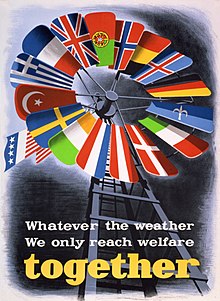Our website is made possible by displaying online advertisements to our visitors.
Please consider supporting us by disabling your ad blocker.
Atlanticism

Atlanticism, also known as Transatlanticism,[1] is the ideology which advocates a close alliance between nations in Northern America (the United States and Canada) and in Europe on political, economic, and defense issues. The term derives from the North Atlantic Ocean, which is bordered by North America and Europe.
The term can be used in a more specific way to refer to support for North Atlantic military alliances against the Soviet Union,[2] or in a more expansive way to imply broader cooperation, perceived deeply shared values, a merging of diplomatic cultures,[3] as well as a sense of community and some degree of integration between North America and Europe. In practice, the philosophy of Atlanticism encourages active North American, particularly American, engagement in Europe and close cooperation between states on both sides of the ocean. Atlanticism manifested itself most strongly during the Second World War and in its aftermath, the Cold War, through the establishment of various Euro-Atlantic institutions, most importantly NATO and the Marshall Plan, with the purpose being to maintain or increase the security and prosperity of the participating countries during the Cold War and protect liberal democracy and the progressive values of an open society that unite them under multiculturalism.
Atlanticism varies in strength from region to region and from country to country based on a variety of historical and cultural factors. It is often considered to be particularly strong in Eastern Europe, Central Europe, Ireland and the United Kingdom (linked to the Special Relationship). Politically, it has tended to be associated most heavily and enthusiastically but not exclusively with classical liberals or the political right in Europe. Atlanticism often implies an affinity for U.S. political or social culture, or affinity for Europe in North America, as well as the historical bonds between the two continents.
There is some tension between Atlanticism and continentalism on both sides of the Atlantic, with some people emphasising increased regional cooperation or integration over trans-Atlantic cooperation.[4] The relationship between Atlanticism and North American or European integrations is complex, and they are not seen in direct opposition to one another by many commentators.[5] Internationalism is the foreign policy belief combining both Atlanticism and continentalism.[5]
- ^ Klinke, Ian (May 1, 2018). "Geopolitics and the political right: lessons from Germany". International Affairs. 94 (3): 495–514. doi:10.1093/ia/iiy024.
- ^ Croci, Osvaldo (December 2008). "Not a Zero-Sum Game: Atlanticism and Europeanism in Italian Foreign Policy". The International Spectator: Italian Journal of International Affairs. 43 (4): 137–155. doi:10.1080/03932720802486498. S2CID 155056439.
- ^ Weisbrode, Kenneth. The Atlanticists.'' Nortia Press, 2017.
- ^ Mouritzen, Hans (16 May 2007). "Denmark's Super Atlanticism". Nordic International Studies Association. Retrieved 24 June 2015.[permanent dead link]
- ^ a b Kořan, Michal, ed. (2010). Czech Foreign Policy in 2007-2009: Analysis. Ústav mezinárodních vztahů, v. v. i. p. 373. ISBN 978-8086506906. Retrieved 24 June 2015.
Previous Page Next Page


